10 Best ScoreApp Alternatives for Dynamic Assessment Tools
Are you searching for effective ScoreApp alternatives to elevate your assessment marketing strategy? Whether you’re looking for more advanced features, better pricing options, or specialized capabilities, the market in 2025 offers several impressive ScoreApp alternatives worth considering.
In this guide, we’ll explore the top 10 ScoreApp alternatives available today, highlighting what makes each platform unique and how they might better serve your business needs than ScoreApp.
The Growing Need for ScoreApp Alternatives 
While ScoreApp pioneered the assessment-based marketing approach, many businesses now seek ScoreApp alternatives that better address their evolving needs. Today’s marketers require more sophisticated scoring mechanisms, deeper analytics, and seamless integration with their existing tech stacks. As businesses become more data-driven, they’re increasingly turning to ScoreApp alternatives that provide richer insights and more personalized user experiences.
Where ScoreApp Falls Short 
ScoreApp offers solid assessment functionality, but its limitations have prompted many users to explore alternatives. The platform’s relatively high price point can be prohibitive for small businesses and startups. Users also report that the customization options don’t always allow for the level of branding and personalization they need. Additionally, some find the analytics dashboard lacking in depth and the integration options somewhat limited compared to newer ScoreApp alternatives that offer more comprehensive marketing ecosystem connections.
Top 10 ScoreApp Alternatives You Should Consider in 2025 
1. Riddle 
Key Advantages:
- Intuitive assessment builder with drag-and-drop functionality
- Flexible scoring system with weighted question importance
- Customizable results pages with actionable insights
- Comprehensive analytics with user journey tracking
- White-labeling options for complete brand consistency
Ideal Use Case: Riddle shines for consultants and coaches who use assessments as entry points to their service offerings. Its personalized results pages create actionable roadmaps based on assessment responses, helping professionals demonstrate value immediately while nurturing leads toward paid services. The platform’s emphasis on guided next steps makes it particularly effective for conversion-focused assessment strategies.
Limitations: The platform has fewer industry-specific templates than some other ScoreApp alternatives. Some users report that the advanced features come with a learning curve for beginners.
Pricing: Basic plan at $59/month up to $749/month for Enterprise with annual billing.
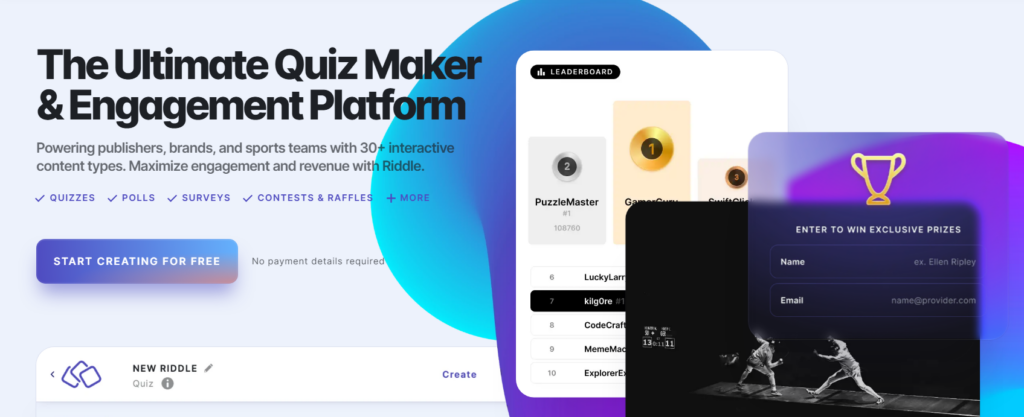
2. AssessmentHero 
Key Advantages:
- Specialized in visual assessment experiences with interactive elements
- Branching logic for personalized assessment paths
- Multi-format question types including slider scales and matrix questions
- Gamification elements to boost completion rates
- Built-in lead capture and nurturing workflows
Ideal Use Case: AssessmentHero works exceptionally well for educational institutions and training companies seeking engaging assessment experiences. Its gamification features transform standard assessments into interactive experiences that maintain user interest throughout longer evaluations. Organizations focused on skills assessment particularly benefit from the platform’s ability to create comprehensive capability mapping with visual results.
Limitations: Some users report occasional performance issues with heavily trafficked assessments. The gamification features can sometimes feel overly casual for strictly professional contexts.
Pricing: Limited free plan with additional fees for more specific tools.

3. QuizWhiz 
Key Advantages:
- AI-powered scoring and recommendation system
- Extensive template library covering various industries
- Simple assessment builder with conditional logic
- Detailed performance analytics with benchmark comparisons
- Strong integration with major CRM and email platforms
Ideal Use Case: QuizWhiz excels for marketing teams focused on lead qualification and segmentation. Its sophisticated scoring system helps identify high-quality leads based on assessment responses, enabling sales teams to prioritize their outreach effectively. The platform’s benchmark comparison feature provides valuable context for results, helping businesses understand where respondents stand relative to industry standards.
Limitations: Less specialized in formal assessment methodology than some ScoreApp alternatives. The AI recommendations require significant data to become highly accurate.
Pricing: Free plan with limited features. Premium plans start at $14/month and up to $400/month for Institutions.
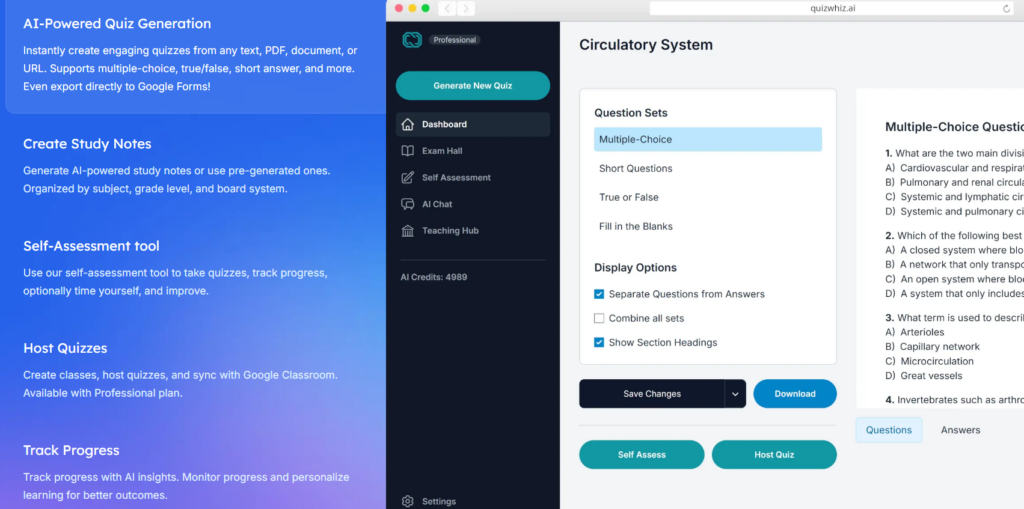
4. Typeform 
Key Advantages:
- Versatile assessment capabilities with beautiful design
- Comprehensive reporting with actionable insights
- Multi-language support for global assessments
- Advanced data security and compliance features
- Customizable assessment journeys with conditional logic
Ideal Use Case: Typeform is the go-to platform for businesses requiring professional-looking assessment tools. Its sleek, minimalist interface provides credibility for professional services firms, healthcare organizations, and educational institutions that need polished assessment experiences. The platform’s robust security features also make it ideal for handling sensitive information in compliance-heavy industries.
Limitations: Higher price point than many ScoreApp alternatives. Some users find the form-first approach less specialized for comprehensive assessments.
Pricing: Free plan available with limited features. Paid plans start at $25/month for Basic, $50/month for Plus, and $83/month for Business.
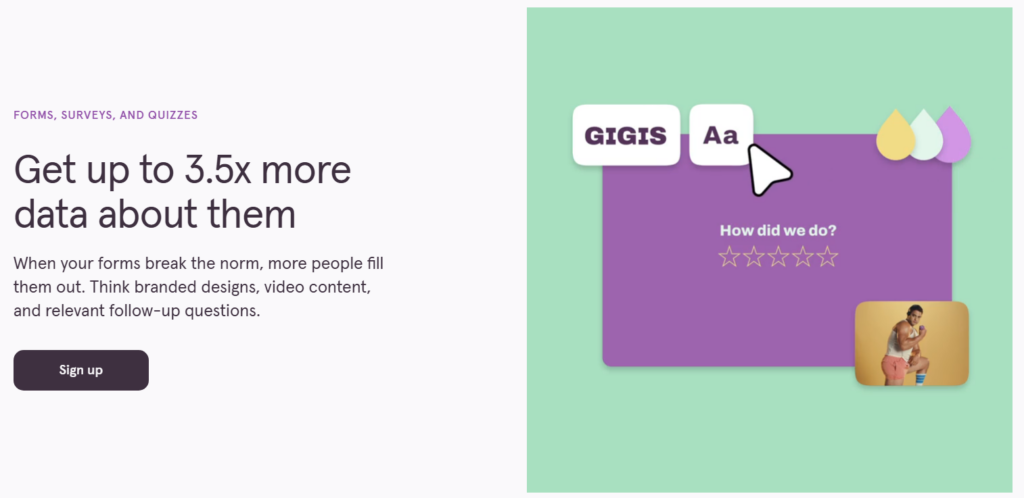
5. UpFunnel 
Key Advantages:
- Seamless integration with marketing automation tools
- Personalized follow-up sequences based on assessment results
- Visual assessment builder with extensive customization options
- Comprehensive analytics with conversion tracking
- Advanced lead scoring and segmentation capabilities
Ideal Use Case: UpFunnel stands out for businesses looking to integrate assessments into sophisticated marketing funnels. Its powerful automation capabilities create personalized customer journeys based on assessment responses, nurturing prospects with targeted content and offers. E-commerce businesses particularly benefit from UpFunnel’s ability to match product recommendations to assessment results, increasing conversion rates and average order values.
Limitations: More marketing-focused than pure assessment-focused ScoreApp alternatives. Some users report that the extensive feature set comes with a steeper learning curve.
Pricing: Plans start at $9/month and vary based on the number of responses.
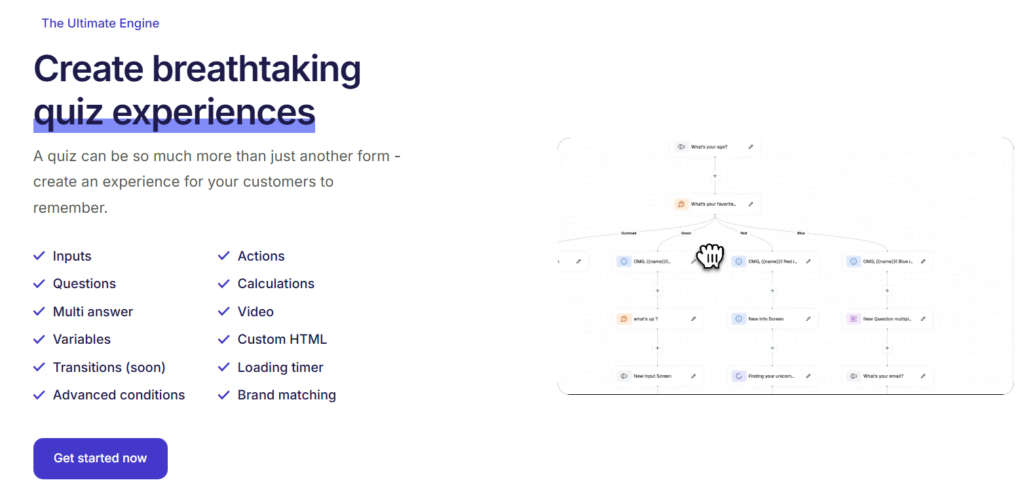
6. SurveySparrow 
Key Advantages:
- Conversational interface for engaging assessment experiences
- User-friendly builder requiring minimal technical skills
- Affordable pricing with generous feature inclusion
- Mobile-optimized assessments for on-the-go completion
- Extensive sharing capabilities for assessment results
Ideal Use Case: SurveySparrow is perfect for small businesses and solopreneurs who need to implement assessments quickly without technical complexity. Its conversational interface and extensive template library allow users to launch professional assessments within minutes rather than hours. Content creators and influencers also appreciate SurveySparrow’s sharing features that increase visibility and engagement with their assessments.
Limitations: Fewer advanced assessment-specific features compared to premium ScoreApp alternatives. Limited customization options for complex assessment logic.
Pricing: Basic plan starts at $19/month, Business at $49/month, and Enterprise at custom pricing when billed annually.
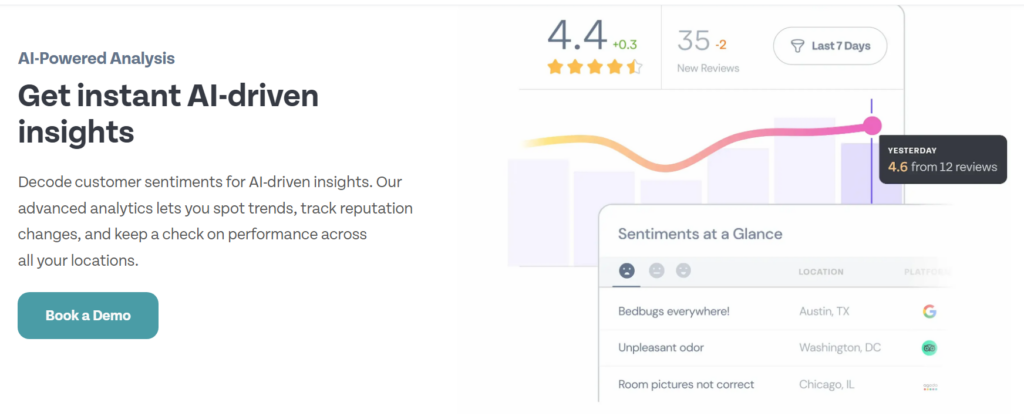
7. Qualtrics 
Key Advantages:
- Enterprise-grade data visualization of assessment results
- Advanced analytics with demographic filtering
- Customizable scoring methodologies
- Benchmark comparison against industry standards
- API access for custom integrations
Ideal Use Case: Qualtrics is ideal for data-driven organizations that need to extract meaningful insights from assessment results. Its robust analytics platform helps identify patterns and trends across large respondent groups, making it valuable for market research firms and enterprise companies. Organizations conducting industry benchmarking particularly benefit from Qualtrics’ comparative analysis capabilities.
Limitations: More complex to set up than some ScoreApp alternatives. The enterprise focus makes it less intuitive for simple assessment needs.
Pricing: Custom pricing is available upon request.
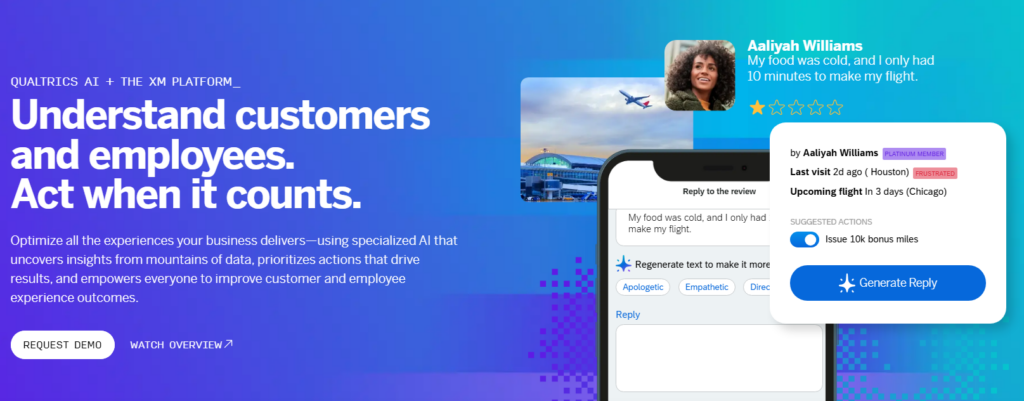
8. Paperform 
Key Advantages:
- Rapid assessment creation with intuitive form-building
- Embeddable assessments for websites and social platforms
- Conversion-optimized results pages with call-to-action options
- Real-time results with instant feedback mechanisms
- Comprehensive respondent data collection
Ideal Use Case: Paperform performs exceptionally well for digital marketers focused on creating versatile, branded assessments. Its embedding capabilities make it easy to distribute assessments across various platforms, extending reach and generating leads from multiple channels. Media companies and content marketers leverage Paperform to create engaging interactive content that drives traffic while collecting valuable audience data.
Limitations: Analytics are somewhat basic compared to more advanced ScoreApp alternatives. Some users mention the balance between form and assessment features can be challenging.
Pricing: Essentials plan at $24/month, Pro at $49/month, and Business at $99/month with annual subscription.
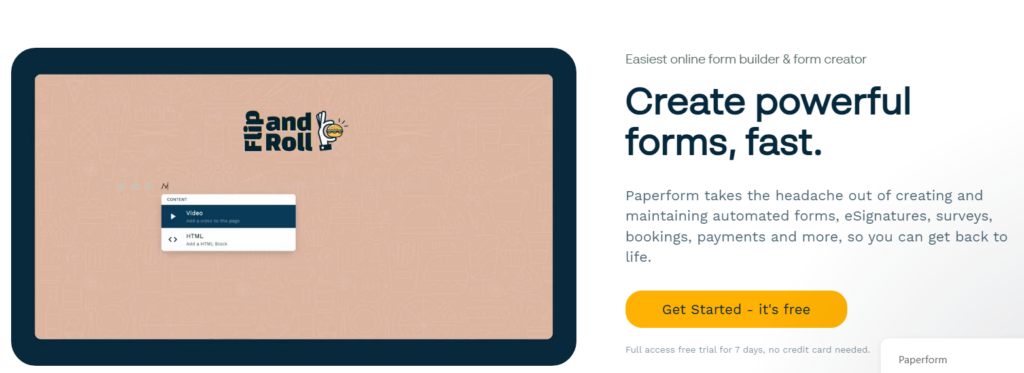
9. FormStack 
Key Advantages:
- Integration of assessments within broader form functionality
- Advanced data processing and routing capabilities
- Workflow automation based on assessment results
- Enterprise-grade security and compliance features
- Extensive third-party integrations
Ideal Use Case: FormStack works best for organizations that need to incorporate assessments into wider data collection processes. Its powerful workflow automation helps businesses streamline operations by routing assessment results to appropriate team members or triggering specific actions. Healthcare providers and financial services companies particularly value FormStack’s security features for collecting sensitive information while maintaining compliance.
Limitations: Not specifically designed for assessments like dedicated ScoreApp alternatives. The broader form functionality can make the interface feel less focused for assessment-specific needs.
Pricing: Plans start from $83/month when billed annually.
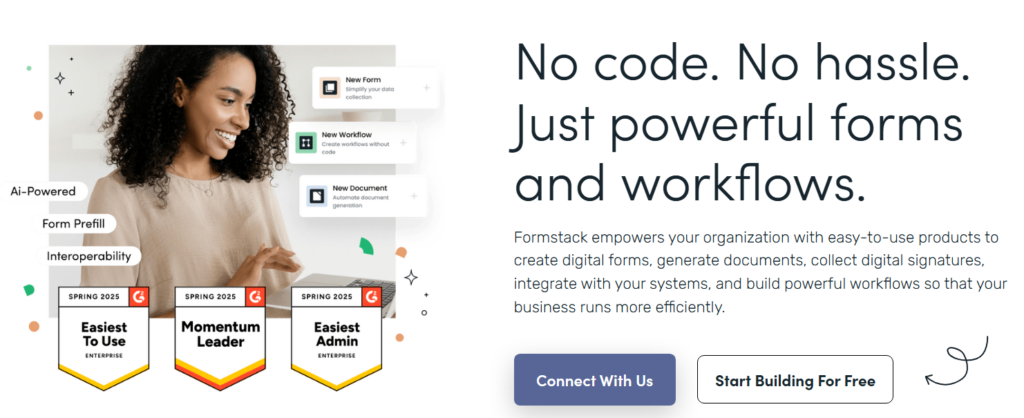
10. LeadQuizzes 
Key Advantages:
- Focus on lead generation through assessment-driven insights
- Result-based product and service recommendations
- Scoring methodologies with customizable algorithms
- Detailed lead data collection
- Strong email marketing platform integrations
Ideal Use Case: LeadQuizzes specializes in helping businesses convert prospects through lead-focused assessments. Its sophisticated lead capture creates professional pathways that showcase expertise and establish trust with potential clients. Marketers and agencies particularly benefit from LeadQuizzes’ ability to present assessment results in a context that naturally leads to product offerings or service engagements.
Limitations: More focused on lead generation than comprehensive assessment. Some users mention that the design customization process could be more intuitive.
Pricing: Startups at $9/month, Standard at $37/month, Pro at $74/month, and Premium at $186/month with annual commitment.
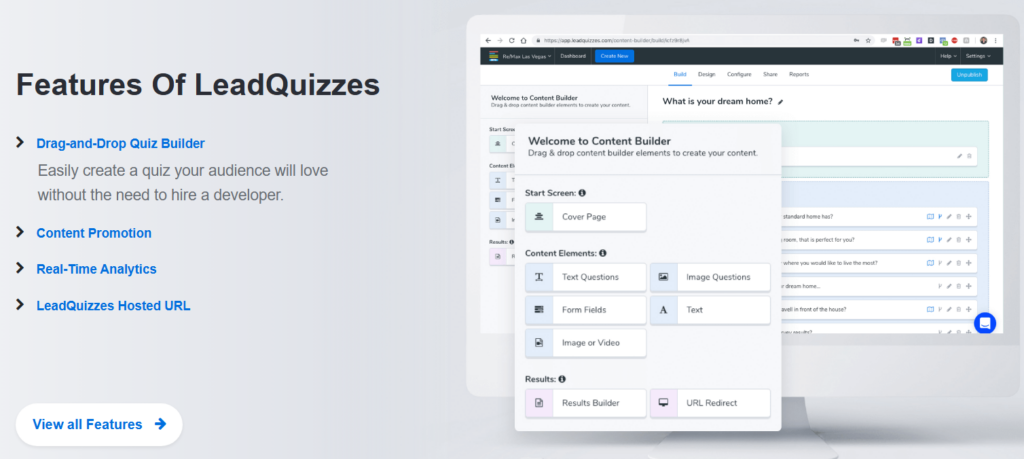
How to Select the Right ScoreApp Alternative for Your Needs 
When choosing among these ScoreApp alternatives, follow these practical steps to find your perfect match:
Assessment Purpose
First, clarify exactly what you need your assessments to accomplish. For lead generation focus, platforms like LeadQuizzes and UpFunnel offer specialized tools that optimize conversion. If you need educational assessments, Typeform and Qualtrics provide robust scoring and reporting features. For customer segmentation, consider SurveySparrow or Paperform with their strong integration capabilities.
Integration Requirements
Take inventory of your essential tech stack connections. If you use popular email marketing or CRM platforms, verify that your chosen platform connects directly with these tools. Typeform and Formstack offer the widest range of native integrations, while Paperform works seamlessly with Zapier to connect with hundreds of apps. Always test these connections during your free trial period.
Budget Constraints
Match your budget to value rather than just price. If you’re a solopreneur, SurveySparrow’s Basic plan provides excellent value for essential features. For growing businesses, Riddle’s Pro plan balances cost with capabilities. Enterprise users should consider Qualtrics or Formstack for their robust feature sets. Many platforms offer significant discounts for annual billing—choose this option for established use cases.
Design Flexibility
Evaluate platforms based on your specific design needs. For highly customized branding, Typeform and Paperform offer exceptional design flexibility with no coding required. If you need advanced white-labeling capabilities, Riddle and LeadQuizzes provide comprehensive options for removing platform branding and using custom domains. Always preview your assessment on multiple devices during the trial to ensure responsive design.
Data Analysis Needs
Choose based on your analytical requirements. For basic metrics, SurveySparrow and Paperform provide easy-to-understand dashboards. For detailed user journeys, UpFunnel and Riddle offer visualization of the complete respondent path. If you need advanced segmentation and pattern recognition, Qualtrics is unmatched for its enterprise-grade analytics. Consider exporting a test dataset during your trial to verify you can extract the insights you need.

Conclusion: Moving Beyond ScoreApp in 2025 
While ScoreApp pioneered the assessment marketing space, these alternatives offer compelling reasons to switch, whether you’re seeking better pricing, more specialized features, or deeper analytics capabilities. By carefully evaluating these ScoreApp alternatives against your specific business requirements, you can find a platform that not only meets your current needs but can scale with your business as your assessment strategy evolves.
Test drive a few of these ScoreApp alternatives using their free trials to experience their interfaces and capabilities firsthand. The right assessment platform can transform your lead generation, customer insights, and ultimately your business growth. And if you are looking for inspirational quiz ideas don’t forget to read this article.
